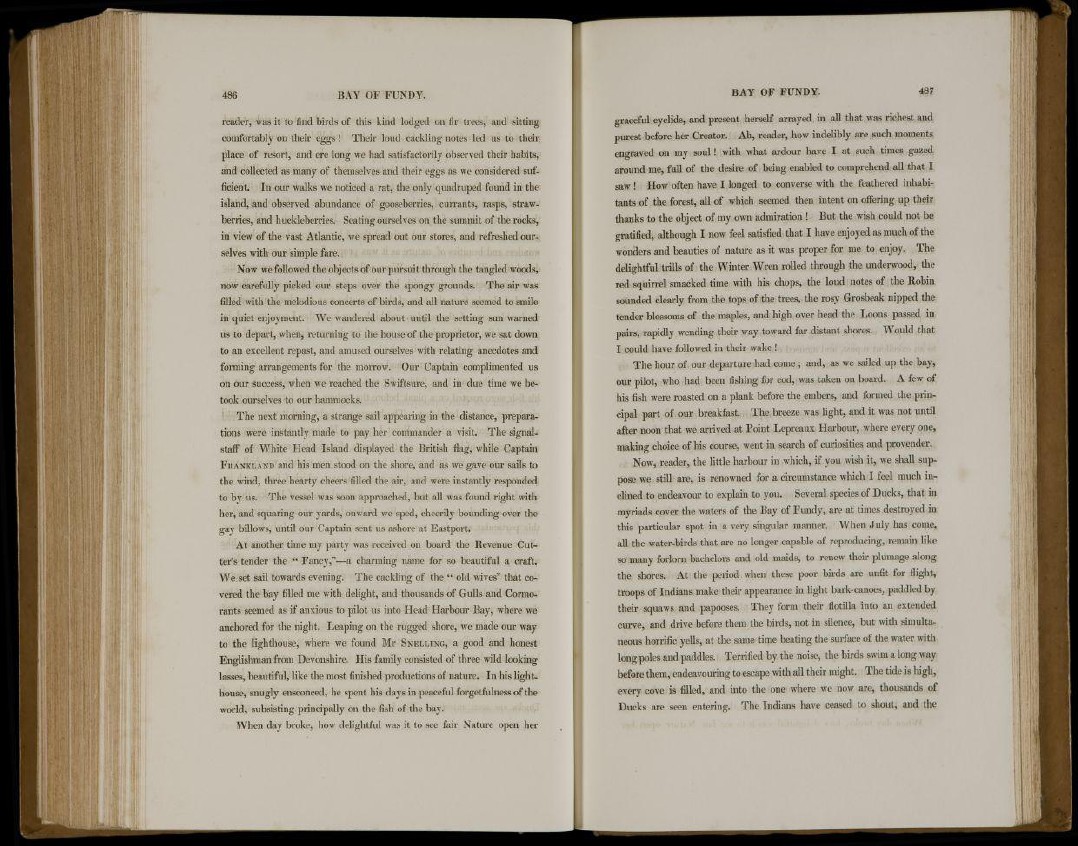
reader, was it to find birds of this kind lodged on fir trees, and sitting
comfortably on their eggs ! Their loud cackling notes led us to their
place of resort, and ere long we had satisfactorily observed their habits,
and collected as many of themselves and their eggs as we considered sufficient.
In our walks we noticed a rat, the only quadruped found in the
island, and observed abundance of gooseberries, currants, rasps, strawberries,
and huckleberries. Seating ourselves on the summit of the rocks,
in view of the vast Atlantic, we spread out our stores, and refreshed ourselves
with our simple fare.
Now we followed the objects of our pursuit through the tangled woods,
now carefully picked our steps over the spongy grounds. The air was
filled with the melodious concerts of birds, and all nature seemed to smile
in quiet enjoyment. We wandered about until the setting sun warned
us to depart, when, returning to the house of the proprietor, we sat down
to an excellent repast, and amused ourselves with relating anecdotes and
forming arrangements for the morrow. Our Captain complimented us
on our success, when we reached the Swiftsure, and in due time we betook
ourselves to our hammocks.
The next morning, a strange sail appearing in the distance, preparations
were instantly made to pay her commander a visit. The signalstaff*
of White Head Island displayed the British flag, while Captain
FIIANKLAND and his men stood on the shore, and as we gave our sails to
the wind, three hearty cheers filled the air, and were instantly responded
to by us. The vessel was soon approached, but all was found right with
her, and squaring our yards, onward we sped, cheerily bounding over the
gay billows, until our Captain sent us ashore at Eastport.
At another time my party was received on board the Revenue Cutter's
tender the " Fancy,"—a charming name for so beautiful a craft.
We set sail towards evening. The cackling of the " old wives1' that covered
the bay filled me with delight, and thousands of Gulls and Cormorants
seemed as if anxious to pilot us into Head Harbour Bay, where we
anchored for the night. Leaping on the rugged shore, we made our way
to the lighthouse, where we found Mr SNEI.LING, a good and honest
Englishman from Devonshire. His family consisted of three wild looking
lasses, beautiful, like the most finished productions of nature. In his lighthouse,
snugly ensconced, he spent his days in peaceful forgetfulness of the
world, subsisting principally on the fish of the bay.
When day broke, how delightful was it to see fair Nature open her
graceful eyelids, and present herself arrayed in all that was richest and
purest before her Creator. Ah, reader, how indelibly are such moments
engraved on my soul! with what ardour have I at such times gazed
around me, full of the desire of being enabled to comprehend all that I
saw ! How often have I longed to converse with the feathered inhabitants
of the forest, all of which seemed then intent on offering up their
thanks to the object of my own admiration ! But the wish could not be
gratified, although I now feel satisfied that I have enjoyed as much of the
wonders and beauties of nature as it was proper for me to enjoy. The
delightful trills of the Winter Wren rolled through the underwood, the
red squirrel smacked time with his chops, the loud notes of the Robin
sounded clearly from the tops of the trees, the rosy Grosbeak nipped the
tender blossoms of the maples, and high over head the Loons passed in
pairs, rapidly wending their way toward far distant shores. Would that
I could have followed in their wake !
The hour of our departure had come ; and, as we sailed up the bay,
our pilot, who had been fishing for cod, was taken on board. A few of
his fish were roasted on a plank before the embers, and formed the principal
part of our breakfast. The breeze was light, and it was not until
after noon that we arrived at Point Lepreaux Harbour, where every one,
making choice of his course, went in search of curiosities and provender.
Now, reader, the little harbour in which, if you wish it, we shall suppose
we still are, is renowned for a circumstance which I feel much inclined
to endeavour to explain to you. Several species of Ducks, that in
myriads cover the waters of the Bay of Fundy, are at times destroyed in
this particular spot in a very singular manner. When July has come,
all the water-birds that are no longer capable of reproducing, remain like
so many forlorn bachelors and old maids, to renew their plumage along
the shores. At the period when these poor birds are unfit for flight,
troops of Indians make their appearance in light bark-canoes, paddled by
their squaws and papooses. They form their flotilla into an extended
curve, and drive before them the birds, not in silence, but with simultaneous
horrific yells, at the same time beating the surface of the water with
long poles and paddles. Terrified by the noise, the birds swim a long way
before them, endeavouring to escape with all their might. The tide is high,
every cove is filled, and into the one where we now are, thousands of
Ducks are seen entering. The Indians have ceased to shout, and the